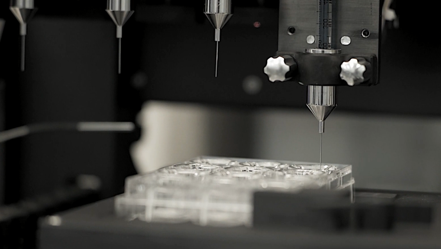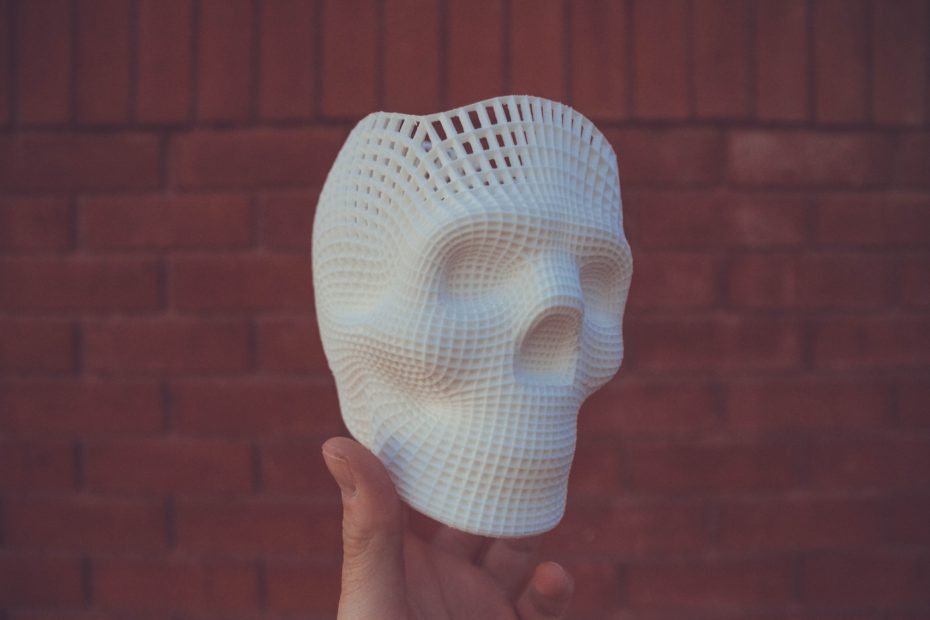Bioprinting is an extension of 3D printing that can be used to produce living tissue, bone, blood vessels and, potentially, whole organs for use in medical procedures, training and testing. It is an additive manufacturing process where biomaterials such as hydrogels or other polymers are combined with cells and growth factors, then printed to create tissue-like structures that imitate natural tissues. Below is a list of seven companies that offer innovative and sophisticated bioprinting solutions:



Aspect Biosystems combines the power of microfluidics and 3D bioprinting to create living, human tissues for medical research, therapeutic discovery, and regenerative medicine products that can save lives and make people healthier.
One of their focus areas is 3D Bioprinted Meniscus Tissue, where the company is combining custom tissue design, biomaterial flexibility, and fibre patterning to generate a meniscus implant mechanically suitable for surgical implantation. Microfluidic 3D bioprinting will enable the on-demand fabrication of personalized meniscus implants with customized dimensions to precisely match the anatomy of the patient’s knee.
Find out more about Aspect Biosystems by clicking here.
This San Diego, California based company’s bioprinter technology has been used to create a spectrum of tissues: liver, kidney, intestine, skin, vascular, bone, skeletal muscle, eye, breast and pancreatic tumor. Organovo pioneers a unique set of therapeutic and drug profiling capabilities based on their revolutionary ability to 3D bioprint tissues that mimic key aspects of human biology and disease.



Find out more about Organovo by clicking here.



Cyfuse Biomedical offers a bioprinter called Regenova, which utilizes a technique called “Kenzan”. This bioprinter can print three-dimensional cell structures, for example, human tissue, using cell spheroids in little needle clusters. Every spheroid contains a huge number of cells, and once they are put alongside different spheroids, they are refined and cultured, prompting to self-organization, and ultimate tissue. The firm can print biological components such as nerves, cartilage, blood vessels, and even functional liver.
Find out more about Cyfuse Biomedical by clicking here.
Allevi creates tools and solutions to design, engineer and build with life. Its 3D bioprinters and bioinks are used around the world to find solutions to humanity’s most difficult problems – to cure disease, to test novel drugs, and to eliminate the organ transplant waiting list. It currently offers 3 bioprinters – Allevi 1, Allevi 2 and Allevi 3.
Check out the Allevi 3 in action:
Find out more about Allevi by clicking here.



This South Korean company offers several products including an Organ Regenerator called Dr. INVIVO 4D. Dr. INVIVO 4D was developed for biomedical researchers and material engineers to pattern cells, biomolecules, and polymers to explore multi-material 3D composite structures, from tissues to novel biocompatible materials. In its entirety, Dr. INVIVO 4D supports printing temperature from below zero up to 350 ℃ and a pressure up to 10 bar with dedicated temperature control and air compressor powerhouses provided in addition to the main printer unit.
Find out more about Rokit Healthcare by clicking here.
In 2016, CELLINK commercialized the world’s first bioink, a biomaterial innovation eight years in the making. That milestone was the first of many along the company’s four-year journey to become the world’s leading bioprinting company with systems used to optimize cell-based applications for more than 1,000 scientists across more than 55 countries.



The company develops both bioprinters and bioprinting materials for providing ready-to-print or use models for researchers and healthcare providers to enable 3D cell culture, personalized medicine, and enhanced therapeutics. The company focuses on three core application areas: bioprinting, analysis and liquid handling/bioprocessing and it has been designing and acquiring complementary technologies within these fields.
Find out more about CellLink Life Sciences by clicking here.
This Texas-based bioprinting company gives hope to breast cancer survivors not to lose their sense of femininity even after serious surgeries. The company uses 3D printers for various reconstructive and cosmetic surgeries. Their treatments range from autologous cell therapy for vitiligo patients to nipple reconstruction for breast cancer survivors. They try to apply the patients’ own pigment-producing cells (melanocytes) and tissues during the printing process to lower the chance of rejection and allow patients to have a high quality of life.
Find out more about TeVido by clicking here.
